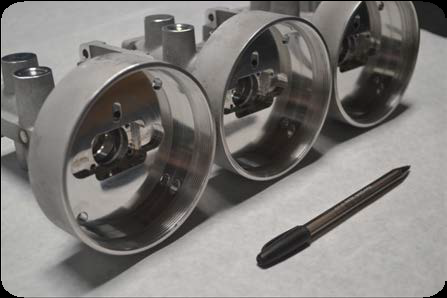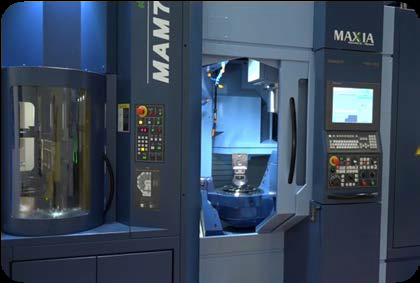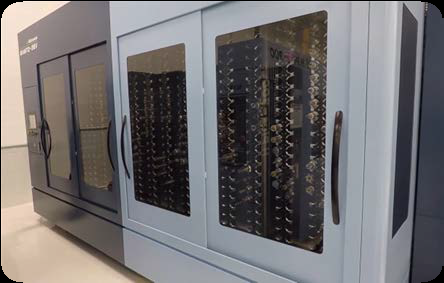High-torque knobs improve tooling performance
More than most industries, today’s aerospace, defense, and automotive component manufacturing is challenged with machining exotic alloys and hard metals. This can take a toll on the carbide cutting tools used, and the result is that the tools must be changed out more frequently as they dull or break. Tool replacement, and production downtime, can escalate costs as well.

Preco Manufacturing in Riverside, California, manufactures precision machined components for military, government, and commercial customers around the world.
The company recently replaced all of their machines with state-of-the art equipment to take full advantage of today’s sophisticated manufacturing technologies, according to Martin Munguia, company president.
The ISO9000:2008 and AS9100 Registered Company’s goal is to control costs and provide a shorter turn around by manufacturing all phases of a component from start to finish–regardless of its critical tolerances.
To achieve the result of holding tight tolerances, the company invested approximately $1.6 million in the MAM72-35V Matsuura 5-axis machining center that can achieve unmanned, simultaneous production of parts for integrated close tolerances.

The unit provides the advanced integration of a multi pallet stacker, tool carousel, and close tolerance machining center. It also features a 35-tower pallet system with and exceptionally high option of a 520 tool matrix magazine base. This robust configuration was able to meet the manufacturing challenges of Preco’s predominantly exotic material castings such as stainless steel, titanium, and aluminum alloys, which creates a unique set of production machining hurdles when considering that it typically requires high speeds in excess of 20,000 RPMs. The MAM72-35V features a 20,000 RPM Hi-Tech spindle, coupled with hand built precision, which makes for an accurate and robust unattended solution for complex work like Preco’s.
While optimizing machining to its limits via hard torque, Preco was experiencing frequent broken retention knobs. Additionally, they would experience excessive chatter at high RMPs because the tooling wasn’t balanced. Therefore, finding a solution for manufacturing high speed aluminum parts with chrome finishes at 20,000 RPMs was key.
The immediate goal for Preco was to find a “fool-proof/no-excuses” retention knob solution that wouldn’t fail. This would allow them to avoid increased costs per part, and negate impact to their ability to move toward their goal of “max-capacity/max-efficiency” aerospace manufacturing.

Imperatively, a retention knob solution had to be found to improve the contact, reduce the spindle loads, and increase the speeds and feeds–all while improving the capacity to remove more cubic inches of metal per minute.
In researching knobs, Preco contacted JM Performance Products Inc. in Fairport Harbor, Ohio, a manufacturer of CNC mill spindle optimization products since 2009 that offer high-torque retention knobs that can address the gamut of vital and costly CNC V-Flange tooling production issues that negatively impacts tool life.

The retention knobs are designed to eliminate the toolholder expansion responsible for costly and ongoing CNC milling and boring issues. Toolholder expansion caused by standard retention knob installation can reduce the toolholder to spindle contact by 70% or more. Key to the design is a relief beneath the precision pilot that forces the threads of the knob deeper into the threaded bore of the toolholder where a thicker cross-section of material resists the expansion and deformation.
JMPP Plant Manager, Craig Fischer, said, “Fundamentally, JMPP’s knobs also work as an integrated system that starts at the connection of the spindle and the knob. The system includes precision-cut threads which takes into account the mechanical functionality of each thread, magnetic particle testing that will reveal any faults and cracks in the material, installation torque specifications based on draw bar force and taper size, as well as replacement recommendation specifications.”
Preco was using more than 100 tools on its MAM72-35V machine so they tested a High Torque knob for every tool including drills, facemills, and taps. The same knobs were used across multiple tools including a 1” reeler, 2” base mill and 32K end mill.
Preco’s Machinist-Operator, Sam Flores, expanded on these advantages, stating, “Achieving better surface finishes also eliminates additional benching operations that add to the cycle times. We’ve had experiences with poor finishes in the past, but now we can run deep 4” bores with six finish with no taper on the end mill.”“The benefits were immediately deep and far reaching as better taper connection resulted in spindle load reduction, increased speeds and feeds, and the ability to remove more cubic inches of metal per minute,” said Munguia. “Most visibly, we were able to achieve a combination of higher quality chrome finishes on parts which is essential in aerospace/defense applications.”
With these empirical results, Preco converted all of its 5-axis machines and milling centers to JMPP’s knobs and have had them in operation for over two years. Munguia concluded that, “In the aerospace and defense industries, price is a factor, but the customer is more interested in top quality parts delivered on time. We wouldn’t dare change back to standard retention knobs.”
